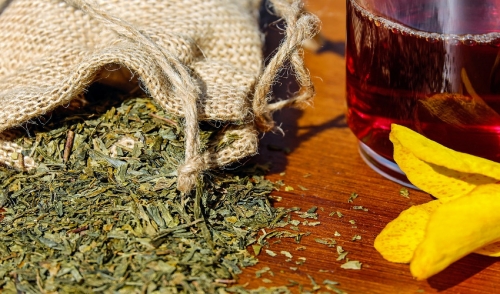
Herbal tea has many uses, from simple relaxation and enjoyment to homeopathic remedies to meditation and reflection. Why not grow your own herbal tea garden to create custom, homemade teas you can enjoy fresh from your own plants?
Best Garden Herbs for Tea
A wide range of herbs and other plants can be brewed as individual teas or incorporated into rich, flavorful tea blends. While the foliage of herbs is the most common part of a plant to be used for tea, flowers, roots and stems can also be part of different teas. The most popular garden plants that can be delicious tea flavors include…
- Basil
- Catnip
- Chamomile
- Fennel
- Ginger
- Jasmine
- Lavender
- Lemon balm
- Lemon verbena
- Linden
- Marjoram
- Mint
- Raspberry
- Rose
- Rosemary
- Sage
- Stevia
- Thyme
These are not the only herbs that can be used in teas. Any herb with a potent aroma or rich flavor could be added to a tea, and experimenting with different flavors and combinations is a delicious way to make the most of your herb garden.
Growing Tea Herbs
Herbs destined for tea can be grown in several ways. You might simply snip herbs you already grow in your outdoor garden, or you could plan a specific tea garden using only the most flavorful herbs. Tea herbs also do well in containers, both outdoors or inside on a sunny windowsill.
When growing herbs for tea, it is important to grow the plants in optimum conditions so they will be as rich and flavorful as possible. Position herbs to meet their sun and soil nutrition needs, but avoid using chemical pesticides or insecticides on herb destined for tea. Prune herbs only sparingly or you will risk damaging the plant and causing foliage to fade and fall. When the growing season is finished, the remainder of the plant can be harvested and dried, and those dried herbs can be used in tea just as easily as fresh herbs, though the flavor may vary somewhat.
Tea Brewing Tips
When using your garden herbs for brewing tea, you'll get the richest, most flavorful blends if you…
- Harvest herbs in the late morning, after the day's dew has dried but before full sunlight and higher temperatures sap the plants of their essential oils and flavoring.
- Experiment with brewing and steeping times. Longer steeping will generally lead to stronger flavor, but some herbs can taste bitter if steeped too long.
- Use three teaspoons (one tablespoon) of fresh herbs for every cup of tea, or just one teaspoon of dried herbs, since drying concentrates the herbs' flavoring.
- Experiment with when to harvest herbs. Most flavors are strongest when herbs are in bud just before they flower, but flowers, roots and fruits add their own distinctiveness to tea as well.
- Lightly rinse fresh herbs before using them in tea to be sure there are no insects, dirt or other contaminants on the plants that will taint the tea.
- Tear or crush herbs just before brewing to avoid wasting the essential oils and flavors that will escape as the foliage or other plant parts are bruised.
- Strain tea before drinking, even if you've used an infuser, bag or tea ball, to be sure all small bits of herbs are removed from the liquid or the overall flavoring will be uneven.
It can be very rewarding, not to mention delicious, to brew tea from your own garden herbs. With just a little care, you'll have a bountiful herb harvest to help you create amazing tea blends you can enjoy all year long.

Comments